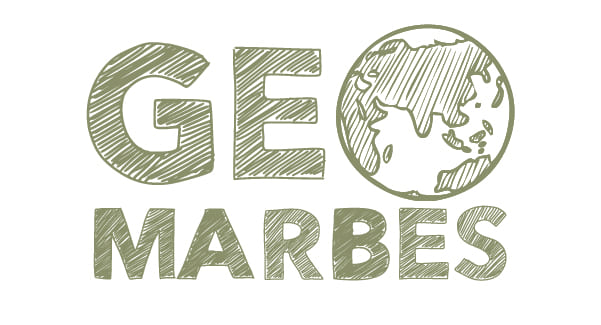It’s Friday morning and we get out of albergue the second, at 6:45 a.m. After the first kilometer we start shooting the first video and the way goes really well. After the third kilometer the joy falls after finding the first blister. I take my shoes off and put on sandals instead. It seems like a good idea at first, because I can walk better this way. However, after two kilometers I put my old shoes back on with a new blister on my feet.
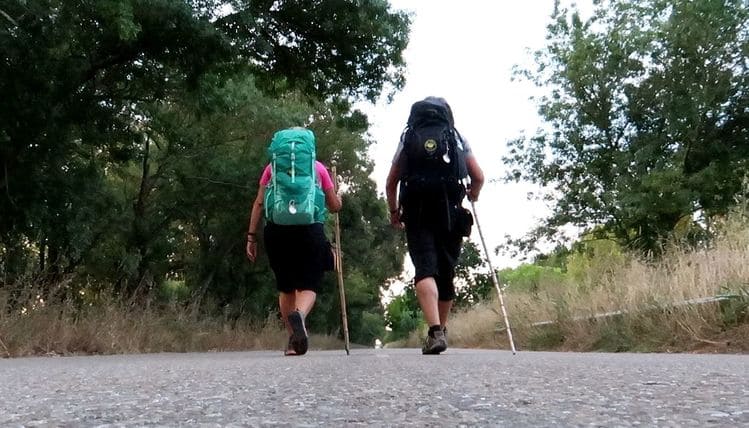
I don’t get it. Also, the back of my right thigh hurts. We haven’t stretched and I guess these are the consequences. I’m cursing myself in my head. After 7 kilometers we got overtaken by a pilgrim riding on a bike who slept in the same albergue. We wish buencamino to each other and continue. We’re walking on the roadway and the passing drivers are waving at us.
“Traveling – it leaves you speechless. It turns you into the narrator afterward.”
(Ibn Battuta)
At the 10th kilometer we stop for breakfast and to fill the water in a café Cafe Campino in Reguengo. We also take off our shoes and face our socks and feet towards the sun so that they would dry. As we’re drinking our coffee and relaxing, the owner of the café comes up to us and tries to tell us something. We’re aplogizing that we don’t understand. We laugh together, thank her for the breakfast and say goodbye. More than 20 km is ahead of us and the more kilometers we walk before lunch, the better.
Blisters, blisters…
We make a short break for changing the patches for our blisters on the outskirts of a town called Valada. Our feet look like they’ve been attacked by some sort of a disease or something. But we know that blisters are an inseparable part of pilgrimage and so we take it as a test, which makes us stronger if we pass it. When we are done with the patches, we continue. I admit that I can feel the blisters but the first few kilometers are the worst and then it’s bearable. We’re passing through small houses on the left side and fruit trees on the right one.
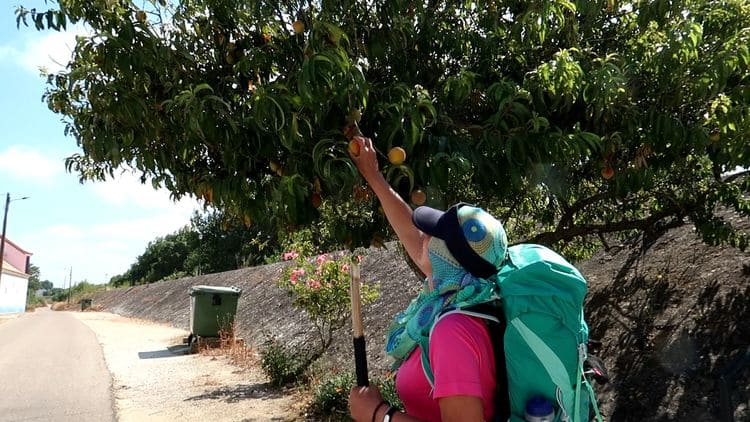
Pluck or not pluck?
We’re stopping at one of the trees and Jitka plucks some peaches. Right at that moment a door from one of the houses opens and an older woman starts shouting something at as and showing us to wait. I’m telling Jitka to get ready to go, that the lady went for a broom or an air gun and that she’s going to punish us for plucking her peaches. Before Jitka says something back, the Portuguese grandma returns with a bowl full of fruit and forces us to take some. She draws a cross on our foreheads and shows us an address to an albergue where she advices us to stay at. She keeps saying something but unfortunately, we don’t understand much. We continue walking and eat our gifts. The fruit from this grandma and meeting her gives us lots of energy and strength.
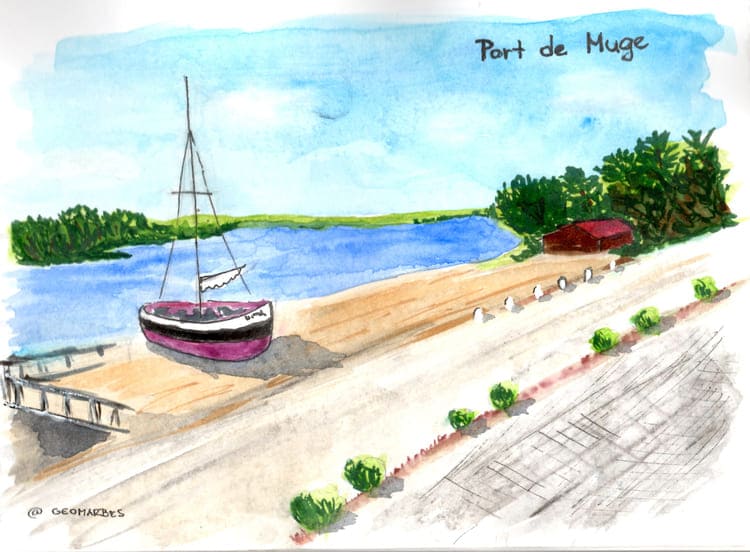
Water is important
A car is stopping us in Porto de Muge. A man in a suit gets out of it and asks us if we’re okay. I look at both Jitka and myself to check that our trousers aren’t ripped or anything and the man continues and asks if we need a ride and when we tell him that we don’t, that we’re on our way to Santarém, he just says that in a couple hundred meters is the last chance to buy some water and that we should buy a lot of it because it really is the last chance in the upcoming 16 kilometers and it should be abnormally hot in the afternoon. We thank him and say goodbye and listen to his advice and buy 4 liters of water in a café on the outskirts.
At the same time, we’re passing through Pension 177 (marked as Quinta da Burra in the guide) which the Portuguese granny told us about. Even though our legs are screaming for a rest, we don’t want to stay in the half of the route with our new stocks of water and so we bravely go towards the second half.
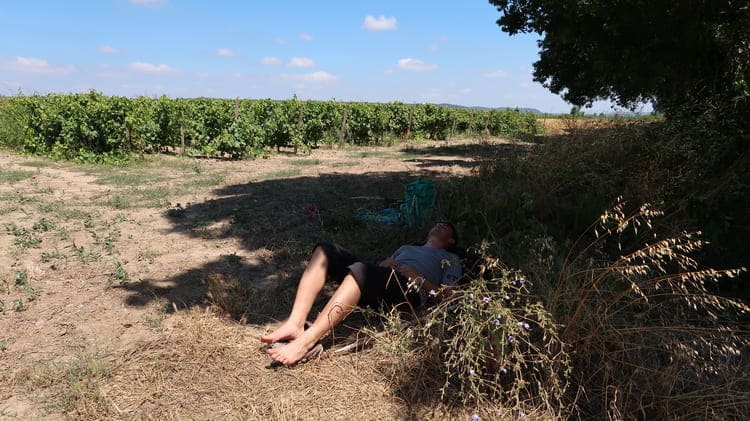
The heat is starting to be unbearable. The wind is now nonexistent, the sun is shining as much as it can and we’re looking for any sign of a shadow on the dirt road where we could stop for a while and drink something. That is why we’re bursting with joy when we see a bunch of trees ahead of us. But there are thorny bushes around them and so we turn left to the vineyard even despite the obvious no entry sign and we take off our backpacks and shoes, including our socks. The shadows, water and a short rest seem so appealing now. But we know we don’t have any time to waste and that we have to get up and go. Our small blisters are slowly becoming bigger so we change the patches again and put some dry socks on.
Santarem or fata morgana?
In one part of the route I suddenly have a feeling that we’re walking in circles. The sun is burning us and when the wind finally blows, it feels like a hairdryer that picks up all the dirt from the road and throws it at our sweaty bodies. There is no shadow anymore. We finally see some new vineyards and fields with peppers ahead of us. Neither the grapes nor the peppers are consumable yet but we pluck some of the grapes anyway. Their sourness makes us train our facial muscles.
I’m trying not to think about how our feet must look now in the sweaty socks. Each step feels like walking on embers but the thought of each step being closer and closer to the goal makes us go. We see a hill in the distance and the city Santarém on it – the goal of today’s route. As Paulo Coelho says in his book The Diary of a Magus, “we ourselves determine the pace of time”. My impatience and constant checking the goal only makes the route go slower for me.
When all it takes to get my attention is for farmers to be in the field. We recognize them as the crew of a truck that passed us a few hours earlier. They recognize us too and we wave at each other. At the foot of the hill, we make another video and gather strength for the last kilometers. After shooting the video, further up the hill on the left side we find something like the ruin of a Roman bath with running water, where we refresh ourselves.

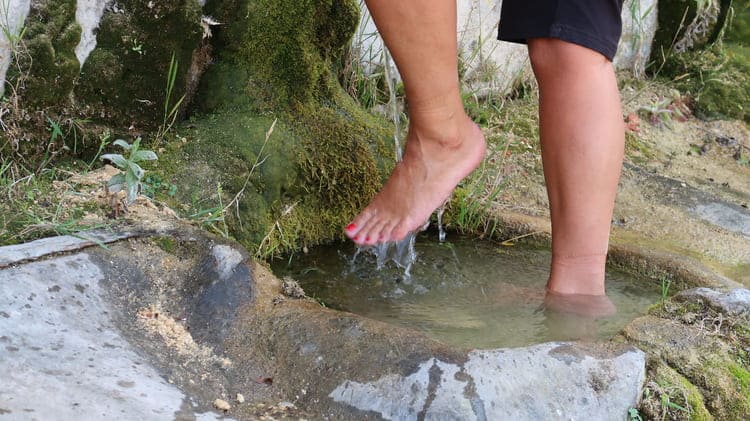
It’s literally an actual water and we feel like we’re crazy. But our joy from this refreshment is huge. We’re finally in the city on the very top of the hill. All we have to do now is find the albergue where we end today by sleeping. The guide shows us a variety of albergues but we choose a hospice Santa Casa de Misericórdia.
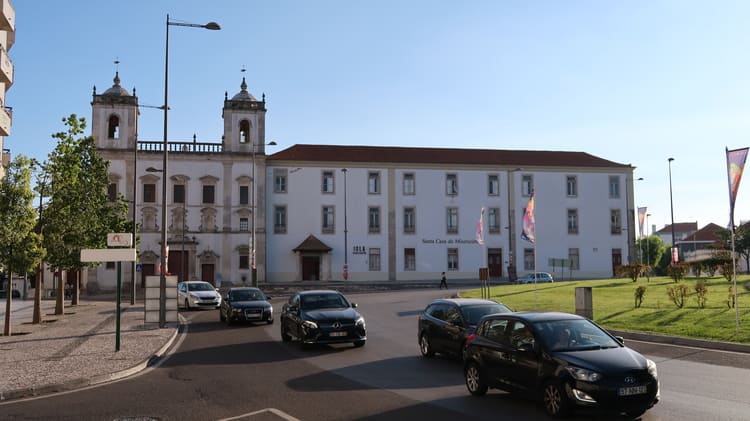
We walk in and ask a man sitting behind the window for the accommodation. Apparently, it costs €5 per person. We fill a form and get a new stamp to our credentials. After that he leads us to some office where he tells us to stay a while. After a few minutes a nice young lady comes in who apologizes and says that our keys aren’t ready yet and that we have to wait a few minutes more. We fill the wait with a conversation where we learn that she went through the whole Jacob’s Trail four times but never in a hot summer. She says that no one is that crazy to do that… but she instantly realizes she called us crazy and apologizes.
Change of plans
When we reveal our plan to go to Fatima and then to Tomar and continue to Porto from there, she says that it’s two days of walking to Fatima and that we would be there by Sunday and that it’s not a good idea. She advices us to hop on a bus and ride to Fatima. Apparently, we’d gain one day for regeneration and we’d avoid the Sunday crowd in Fatima. When I remember the condition of my legs, it seems like a good idea. We agree with Jitka that we’ll discuss it further on the dinner.
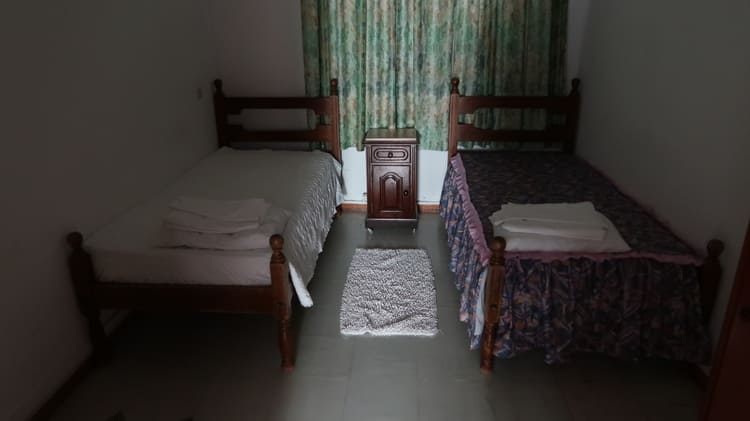
The accommodation is amazing for its price. There are no bunk beds, but double-bedded rooms. On top of that we’re almost alone here. We just hear someone resting from one of the neighbor rooms. Now it’s time for a quick shower and to wash our clothes. Then we’re finally going to look for something to eat. The “receptionist” Sergio tells us that Tascá bar will fill our bellies well. And he was right, the food was awesome and so was the sangria. We just don’t really know how to get up now.
Help me move my legs
Our legs deny cooperation now after we let them rest and focused on our stomachs instead. It’s not the pain, they just can’t really move. It’s the most visible on a crosswalk, where the Portuguese people let the pedestrians go and our slow and wobbly walk obviously slows them down. When we reach the next crosswalk, we rather pretend to be interested in a shop window, where they offer home and vehicle insurance. The pretending ends in the moment when we can’t see any car that would force us to go faster.
When we get to our room, we have to pop our blisters, like it or not. It could be a problem to fit in our shoes with them if we didn’t do that. I’m looking for a sewing kit in my backpack when I’m suddenly holding nail scissors in my hand. I remember the moment on the Prague airport and I just have to laugh. The idiot who doesn’t know that nail scissors don’t belong to the carry-on luggage was me.
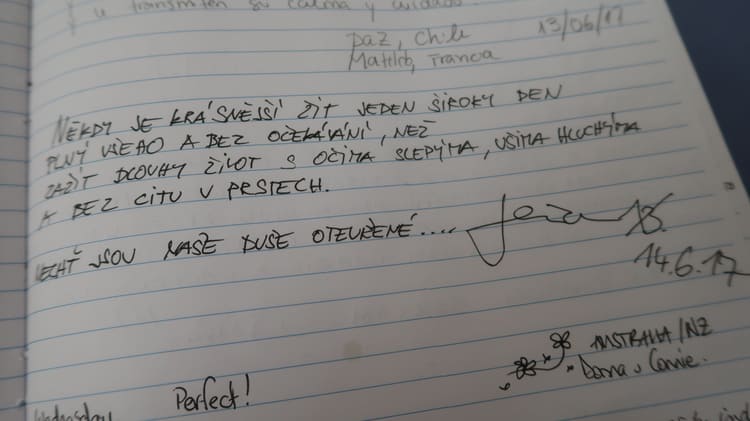
Then we read the messages in a commemorative book and after writing ours we go to sleep and it doesn’t take long and we’re resting like we were killed.
